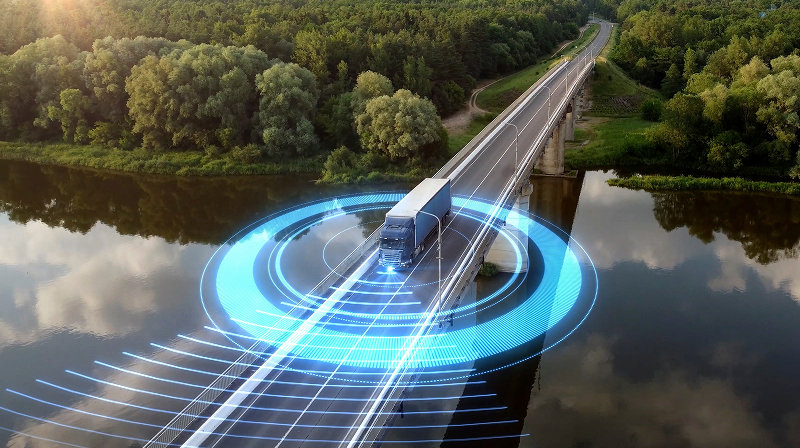Artificial Intelligence (AI) is not just a future idea anymore. It is a powerful technology changing how industries work today. In logistics, where efficiency and precision are critical, AI-powered logistics solutions have emerged as the cornerstone of innovation.
AI is helping the industry by automating manual tasks. It also improves decision-making with real-time insights. This technology is solving many important challenges.
This blog explores how AI is changing logistics. It looks at the benefits, challenges, and future of this technology.
Role of Artificial Intelligence in Revolutionizing Logistics
Artificial Intelligence (AI) is reshaping the logistics industry by driving innovation across every stage of the supply chain. From automating repetitive tasks to enabling smarter decision-making, AI has become the backbone of modern logistics operations.
The technology uses large amounts of data to improve processes. It helps increase efficiency and save costs. This makes it essential for businesses that want to stay competitive.
Understanding AI in Logistics
AI in logistics means using smart algorithms, machine learning, and predictive analytics to improve operations. It goes beyond automation. It helps logistics companies predict future trends, reduce risks, and improve performance.
AI is the key to better logistics strategies. It helps optimize delivery routes, track shipments in real-time, and automate warehouse management.
Why Logistics Needs AI Today
The logistics industry faces ever-growing demands, including faster deliveries, reduced costs, and enhanced customer experiences. Traditional systems often struggle to adapt to these complexities, resulting in inefficiencies and missed opportunities.
AI comes in here. It offers advanced tools to solve important problems. These include route optimization, inventory forecasting, and demand planning.
Some key reasons why AI is essential for logistics transformation include:
• Improved Operational Efficiency:
AI eliminates manual inefficiencies, automates processes, and reduces human errors.
• Real-Time Decision-Making:
With AI, businesses can make data-driven decisions instantly, improving responsiveness.
• Scalability:
AI solutions can easily adapt to handle fluctuating demand and scale with business growth.
AI is more than a tool. It helps logistics companies improve precision, reliability, and profitability.
4 Key Benefits of AI in Logistics and Supply Chain Management
Artificial Intelligence (AI) is revolutionizing logistics and supply chain management by automating processes, optimizing routes, and providing real-time insights. It enhances efficiency, reduces costs, and enables businesses to deliver faster and more reliable services, transforming traditional operations into smarter, data-driven systems.
1. AI-Powered Route Optimization
AI leverages algorithms and data to optimize delivery routes, reducing travel time and fuel consumption. With AI-powered route optimization, logistics companies can achieve faster deliveries, reduced costs, and higher efficiency, especially in last-mile delivery operations.
2. Predictive Analytics in Logistics
AI-driven predictive analytics allows companies to forecast demand, plan inventory, and prepare for potential disruptions. This helps with making decisions early. This is important for handling large shipments in retail, food logistics, and e-commerce.
Looking to optimize your order processing? Check out our guide
3. Real-Time Tracking and Freight Management
AI technologies like real-time tracking offer complete visibility into shipments. Businesses can monitor cargo movements, predict delivery times, and notify customers of any delays. This not only improves operational efficiency but also enhances the overall customer experience.
4. AI for Inventory and Warehouse Management
AI automates warehouse processes such as sorting, picking, and packing. Through inventory optimization, the process maintains accurate stock levels, reducing the chances of overstocking or stockouts.
Want to optimize vehicle delivery in the auto parts industry? Read our full blog here
How AI-Powered Solutions are Reshaping the Logistics Landscape
Artificial Intelligence (AI) is transforming logistics into a smarter, more efficient, and highly responsive industry. AI-powered solutions revolutionize how logistics operations manage tasks, from automating repetitive activities to optimizing complex processes. These technologies provide businesses with real-time insights, enabling faster decision-making and enhanced operational efficiency.
Key areas where AI is reshaping logistics include:
• Intelligent Automation:
Automating tasks like order processing, dispatch planning, and tracking reduces manual effort and improves accuracy.
• Autonomous Vehicles:
Self-driving trucks and drones are revolutionizing last-mile delivery, ensuring faster, cost-effective shipments.
• Enhanced Customer Experience:
Real-time updates and predictive ETAs improve transparency, building trust and satisfaction among customers.
AI can analyze large data sets and give useful insights. This helps logistics companies improve operations, reduce costs, and stay competitive. The industry reshapes itself, and the future of logistics redefines itself.
Choosing logistics software doesn’t have to be tough—Learn how here.
Challenges in Adopting AI in Logistics
Artificial Intelligence (AI) is changing the logistics industry. However, businesses face challenges in adopting it. They must overcome these challenges to fully benefit from AI. These challenges often stem from the complexity of integrating advanced technologies into traditional operations.
1. High Implementation Costs
Adopting AI requires significant investment in infrastructure, software, and talent. For small to mid-sized logistics companies, the high upfront costs can be a major barrier.
2. Integration with Legacy Systems
Many logistics companies still rely on outdated systems. Integrating AI solutions with these legacy systems is complex and time-consuming, often requiring extensive customization.
Discover strategies to improve auto parts delivery efficiency. Read more.
3. Data Privacy and Security
AI systems rely heavily on data to function effectively. Ensuring the security of sensitive data, complying with regulations, and building customer trust are significant challenges.
4. Skills Gap and Training
Implementing AI requires skilled professionals to manage and operate these technologies. Finding and training employees with expertise in AI and machine learning can be difficult for many logistics companies.
5. Resistance to Change
Many employees and stakeholders resist AI adoption. They fear losing their jobs or do not know how to use AI tools.
Even with these challenges, the long-term benefits of AI in logistics are much greater than the initial problems. This makes AI an important investment for businesses that want to stay competitive in the changing logistics world.
Future Trends in AI for Logistics
As logistics continues to evolve, Artificial Intelligence (AI) is at the forefront of driving innovation and efficiency. Future trends highlight the growing importance of AI in automating processes, enhancing supply chain visibility, and achieving sustainability goals. Let’s explore some of the key trends shaping the future of logistics.
• AI and Robotics in Logistics Automation
The integration of robotics with AI is revolutionizing logistics automation. Tasks like sorting, packaging, and loading used to be done by hand.
Now, AI-powered robots handle them efficiently. These solutions lower labor costs and improve accuracy and speed. This helps businesses manage more work with fewer mistakes. The use of drones and autonomous vehicles for deliveries is another emerging trend reshaping last-mile logistics.
Looking to optimize logistics in the food and beverage industry? Read our full blog here.
• AI-Driven Supply Chain Optimization
AI is transforming supply chains into adaptive, data-driven ecosystems. AI in supply chain management uses historical and real-time data. It can predict demand, find bottlenecks, and improve resource use.
This results in more resilient supply chains that can quickly respond to disruptions while minimizing waste and inefficiencies. Businesses that leverage AI for supply chain optimization are better equipped to scale and remain competitive in dynamic markets.
• Emerging Technologies: The Role of AI in Sustainable Logistics
Sustainability is becoming more important for logistics companies. AI is helping them reach their green logistics goals. AI-powered solutions optimize energy usage, reduce fuel consumption, and minimize emissions through smarter route planning and load optimization. By integrating sustainable practices, businesses can align with environmental regulations and meet customer demands for eco-friendly operations.
These future trends show that AI is changing logistics operations. It is also creating new standards for efficiency, adaptability, and sustainability in the industry. Companies that embrace these advancements will be well-positioned to lead the way in the evolving logistics landscape.
Transform Your Logistics with AI Vizzard by nuVizz
Artificial Intelligence drives the future of logistics. nuVizz’s AI Vizzard leads this change. AI Vizzard provides advanced solutions for route optimization, real-time tracking, and predictive analytics. These tools help improve operations, boost efficiency, and create great customer experiences.
Take the next step toward smarter, more sustainable logistics with Vizzard – AI Assistant.
AI is transforming logistics into a more intelligent, efficient, and customer-centric industry. AI in logistics is changing how businesses work. It helps with route optimization and real-time tracking. This technology allows companies to cut costs, improve efficiency, and remain competitive.
As technology keeps changing, more businesses will start using it. It is important for companies to adopt AI solutions to stay competitive.

